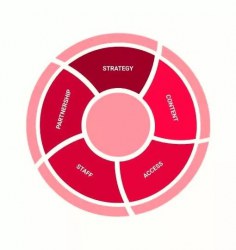A new framework tool, developed by the Equity@Ecsite group, is currently being piloted across Europe.
Supported by the Ecsite Collaborative Grant for 2020, this pan-European project focuses on supporting organisations to take their next steps in re-examining and embedding Equity, Diversity and Inclusion (EDI) across all areas of science centre and museum work.
While one organisation might have a clear policy for physical accessibility and another a successful project with a community group, both might still overlook biased narratives within their content and be lacking diversity among senior staff.
Acknowledging this, the underlying principle of the new Framework, ‘Diversci’ (chosen to emphasise Diversity, Inclusion, Values, Equity & Responsibility in Science Communication) is progression towards organisation-wide, long-term change. There are 5 key areas that we, as Science and Discovery Centres and Museums, must be looking across in order to truly move towards becoming more diverse, inclusive, equitable and accessible organisations. These key and overlapping areas are, Access, Content, Partnerships, Staff and Strategy.
This autumn marks an exciting step forward for this pan-European collaborative project.
We are delighted to announce that 17 European Science Centres and Museums have committed to becoming Pioneering pilot organisations. These Pioneers for Equity, Diversity and Inclusion (referred to as EDI throughout the rest of this piece) will explore the draft framework in-depth; raising awareness, igniting action and scrutinising various areas of their organisations. As part of their journey, we hope to share their learning as they form a close and collaborative community, and become integral members of the wider Ecsite EDI advocacy group.
Introducing our Pioneers
We are excited that Pioneer organisations have joined us from across Europe, and represent the rich diversity of our European science centre network. We have large organisations such as the British Museum with millions of visitors each year and smaller centres such as Centro Ciência Viva Tavira. We have old institutions such as the Natural History Museum of Vienna who can date their collection back to the 18th century, millennium centres such as the National Space Centre and brand-new centres like Futurium in Berlin who only opened their doors at the end of last year. Some of our pioneers are completely independent while others are embedded within universities or trusts. And the level at which we begin our work with these organisations is also incredibly varied. In some cases, CEOs were present during our initial scoping conversations and in other situations we have been approached by an individual who is operating at a much less senior level, keen to explore how this work can ripple out from their own projects across the organisation.
The 17 organisations joining us to pioneer the Framework are confirmed as: Biotopia (Germany), British Museum (UK), CapScience (France), Centre for Life (UK), Ciencia Viva Algarve (Portugal), Ciencia Viva Tavira (Portugal), Futurium (Germany), MUSE (Italy), National Space Centre (UK), Natural History Museum Vienna (Austria), NEMO (The Netherlands), Oxford University Natural History Museum (UK), Technorama (Switzerland), Science Gallery Dublin (Ireland), Science Oxford (UK), Universiteitsmuseum Utrecht (The Netherlands) and Zuiderzee Museum (The Netherlands).
Why Equity Diversity and Inclusion?
All organisations enter the process from different stages and levels. Each organisation has its own internal structures, processes and unique catchments that pose an array of challenges or opportunities for the EDI advocates. Being motivated by the fact that we are facing an increasingly unequal society, the clear and urgent message was stated from our Pioneer community that we must better represent and become more integrated with our own communities.
At this unusual time, we have to acknowledge that the health, and accompanying economic, crises mean many of our Pioneers face strong competing or conflicting strategic priorities. In some instances, centres face huge challenges for survival and the impact of these struggles should not be downplayed.
Nevertheless, as Emily Dawson and Barbara Streicher pointed out in their Spokes article in May 2020, Covid-19 also highlights the need and provides a momentum for change. Pioneers have been utilising a time of closure and restructure as an opportunity to reflect and re-evaluate.
Our Next Steps...
The Pioneers will become a community of advocates, working from different levels and with different areas of focus, but able to share their stories, successes and areas of challenge. They are working in clusters with mentors from the core Equity@Ecsite group. The role of the project mentors is not to act as consultants, but to support the Pioneer organisations on their journey and learning with them about what works and what doesn't within the draft framework. Having been part of the Equity@Ecsite group for a while, mentors can connect local clusters, and also promote the resource of the wider Pioneer community as well as signpost Pioneers towards resources or individuals and organisations working on similar areas.
The facilitation of these connections is part of the power of this piloting process. Ongoing connections include the 150+ network of EDI advocates, ambassadors and activists within our wider Basecamp online community. This is where relevant media, resources, tips and questions can be shared and crowdsourced
If you are keen to hear more, join our Community of Practice calls taking place every other month. Simply send an email to equityatecsite@gmx.net asking to join! These meetings are informal, welcoming and energising, and the Equity@Ecsite team look forward to seeing with you at upcoming Ecsite events where you can tune in to find out what really happened next for our community of Pioneers.

